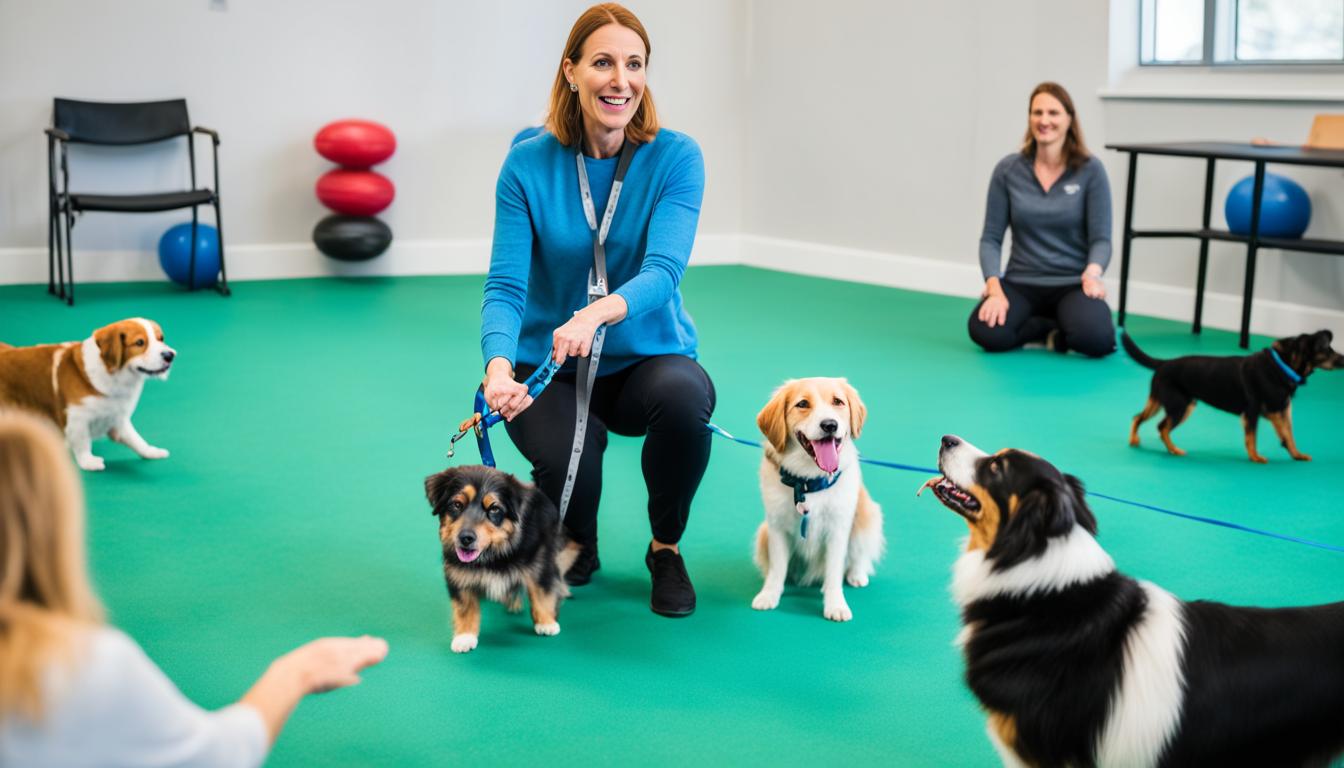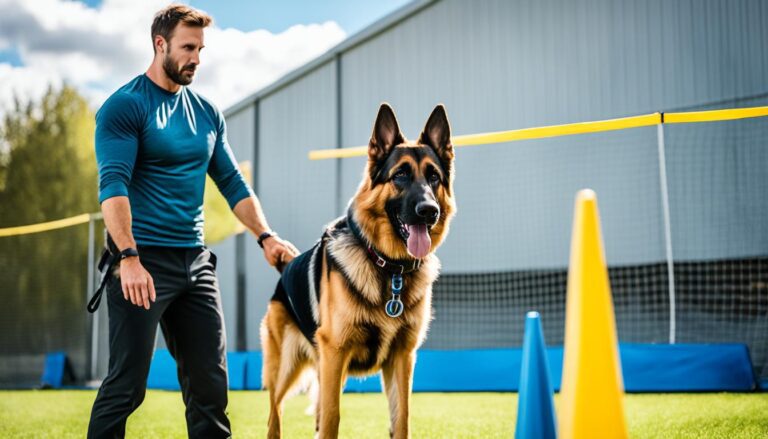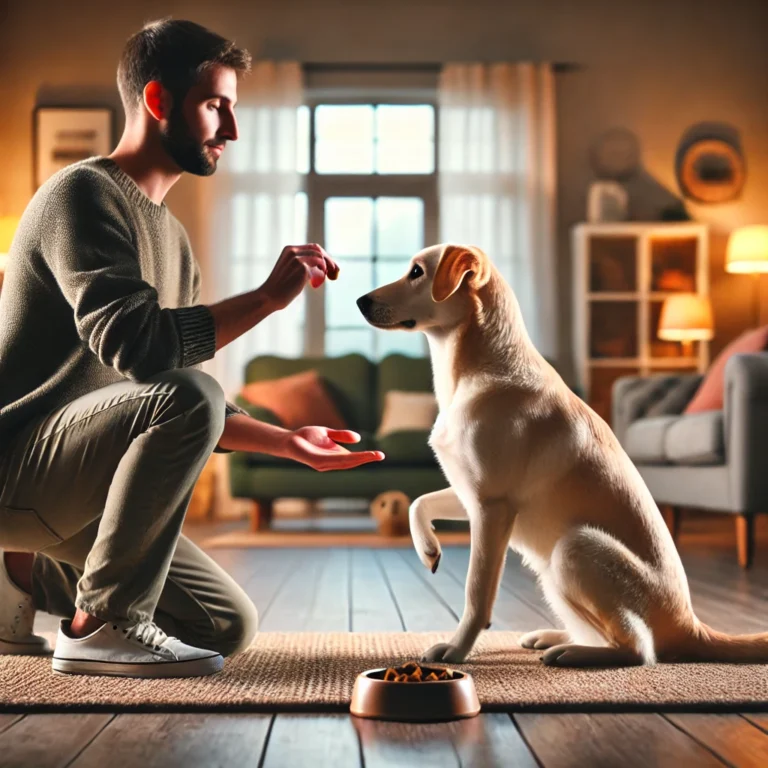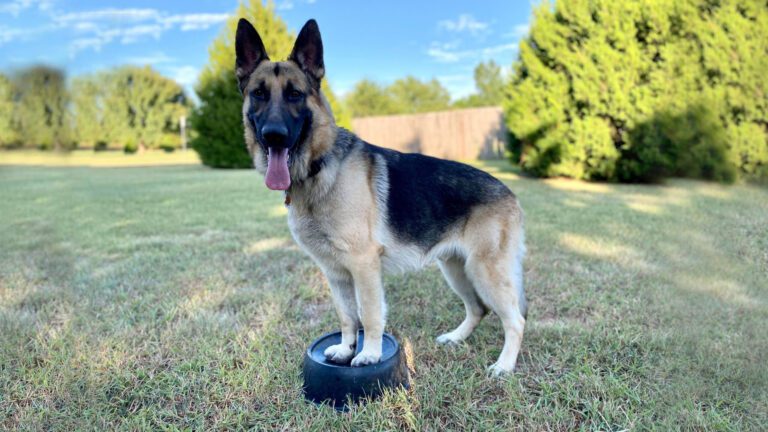how dog behaviorists help
Ever wondered why your furry friend can’t seem to shake off that pesky habit? Dog behaviorists might just be the unsung heroes your pet needs. They dive deep into the canine psyche. They find out why your pet acts a certain way and make plans to help.
Dog behaviorists use science to find out why pets act out. They make special plans to help. They know more about animal behavior than regular dog trainers. They work to make dogs happier and more well-behaved.
Certified Applied Animal Behaviorists (CAABs) have a lot of knowledge and experience. They have a master’s or doctoral degree in science and lots of work experience1. This makes them great at solving complex problems.
For big issues like aggression or anxiety, dog behaviorists are here to help. They work with vets to check for health problems that might be causing the behavior1. This way, they make sure your pet’s body and mind are taken care of.
Key Takeaways
- Dog behaviorists use scientific methods to address canine behavioral issues
- They offer tailored solutions beyond basic obedience training
- Certified professionals have advanced degrees and extensive experience
- Behaviorists can address complex issues like aggression and anxiety
- They often collaborate with vets to ensure comprehensive care
Understanding the Role of Dog Behaviorists
Knowing the difference between dog trainers and behaviorists is key. They both help with dog care but in different ways.
Differentiating Between Trainers and Behaviorists
Dog trainers teach basic obedience and skills to dogs of all kinds. They use positive methods like rewards and fun training23.
Behaviorists deal with big issues like aggression and fear. They find out why dogs act out and help them feel better23.
The Expertise of Certified Applied Animal Behaviorists
CAABs have degrees in psychology or ethology. They get special training and certification from places like the CCPDT or IACP24.
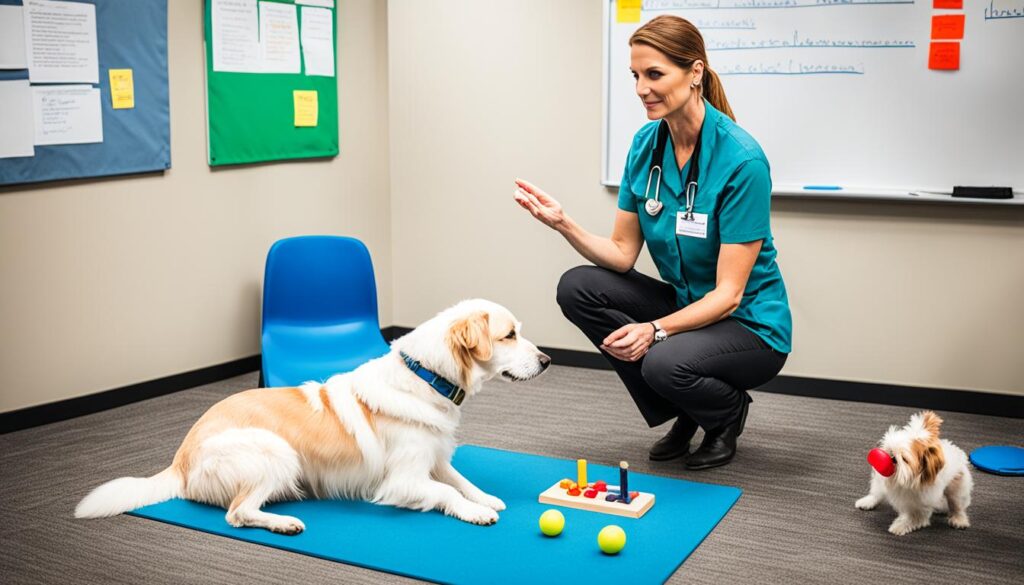
Veterinary Behaviorists: Combining Medicine and Behavior
Veterinary Behaviorists go further. They finish vet school, then do an internship and a behavior residency. They pass a tough exam to become Diplomates of the American College of Veterinary Behaviorists4.
Whether your dog is new or has past issues, knowing these roles helps pick the right expert for your dog’s needs234.
Common Canine Behavioral Issues Addressed
Canine behavior analysts help with many problems pet owners see. They are great at solving dog issues and handling bad behavior. Let’s look at some common problems they fix.
Aggression and Resource Guarding
Many dogs show aggression, like staring, lunging, or growling5. They might also bite or bark loudly. This can happen when they guard their food or space. Experts suggest training and getting help from behaviorists for these issues5.
Anxiety and Phobias
Separation anxiety makes dogs act out when left alone. They might pee inside, bark a lot, or try to escape5. To calm them down, try puzzle toys, dog daycare, and slowly getting them used to being alone5.
Excessive Barking and Destructive Behaviors
Dogs bark for many reasons, like fear or wanting attention5. They chew things because they’re bored, anxious, or teething5. To fix this, teach them the “quiet” command, give them chew toys, and make sure they get enough exercise5.
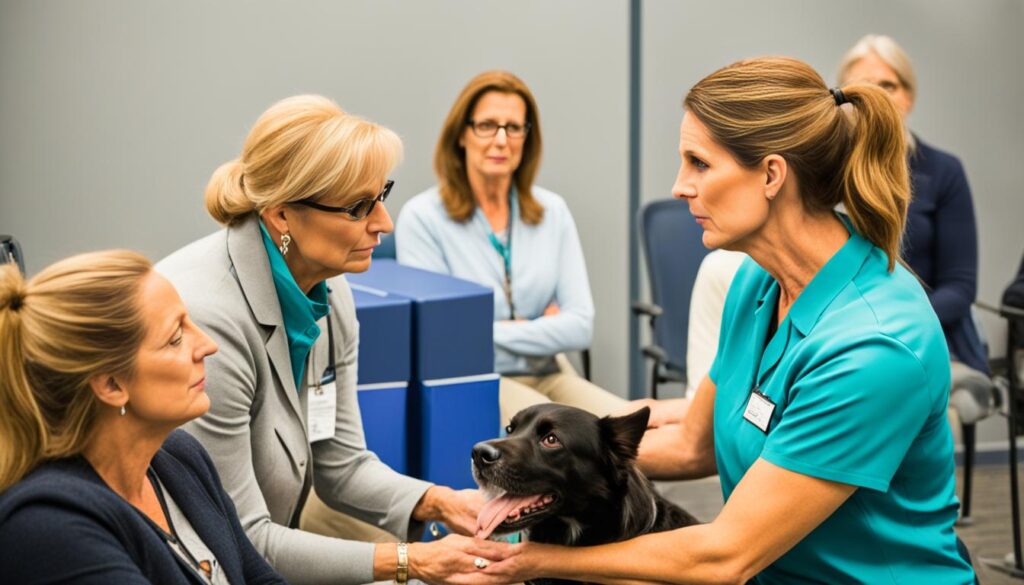
Other issues include digging, begging, and pulling on the leash. These can be fixed with training, managing their environment, and positive reinforcement5.
| Behavior Issue | Common Causes | Management Strategies |
|---|---|---|
| Aggression | Fear, defensiveness, pain | Obedience training, professional help |
| Separation Anxiety | Fear of being alone | Desensitization, puzzle toys |
| Excessive Barking | Boredom, attention-seeking | “Quiet” command, ignoring |
| Destructive Chewing | Anxiety, teething | Provide chew toys, exercise |
By solving these common problems, canine behavior analysts improve the bond between dogs and their owners. This makes pets happier and better adjusted.
How Dog Behaviorists Help: The Process
Dog behaviorists are key in helping dogs with aggression and changing their behavior. They start by looking closely at the dog’s past and where it lives. This helps find out why the dog acts out, often because of fear, anxiety, or being bored6.
Then, they make a plan just for that dog. This plan might use positive ways to train, like clicker training, or building a strong bond6. How long it takes to train can be different, from a few weeks to over a year. This depends on the dog’s age, personality, and how long it has been acting out6.
Veterinary behaviorists are experts with both medical and behavior knowledge. They can handle complex issues like aggression and anxiety. They might suggest special supplements, training methods, or medicines just for that dog7.
| Service | Cost | Duration |
|---|---|---|
| One-on-one professional dog training session | $75 – $250 per hour | Varies |
| Behavioral training program | Depends on duration and complexity | 8 weeks – 1 year+ |
Recently, dog behaviorists have become more popular. This is thanks to TV shows, social media, and more people learning about dog behavior8. Even though there’s no one standard for being a behaviorist, good ones stick to science and keep learning. This helps them help dogs and their owners the best way possible678.
Scientific Approaches to Behavior Modification
Dog behaviorists use proven methods for training and solving dog problems. These methods are based on the latest in animal behavior and learning theory.
Positive Reinforcement Techniques
Positive reinforcement is a big part of training dogs. It means giving rewards for good behavior. This makes dogs want to do it again.
Studies show dogs trained with rewards feel closer to their owners9. This method also works better for solving many behavior problems10.
Counterconditioning and Desensitization
Counterconditioning changes bad behaviors into good ones by rewarding calm actions. Desensitization slowly introduces a dog to scary situations to help them get used to it11.
These methods are great for dogs with anxiety or fear. They can help a dog calm down when the doorbell rings1011.
Environmental Management Strategies
Environmental management changes a dog’s living space to stop bad behaviors. It looks at the dog’s health and living area for the best solutions10. It’s important to know how dogs communicate and act.
The dog training world isn’t regulated, but experts follow certain standards. They use a LIMA framework to reward good behavior with training10. This method is better and less scary for dogs than old ways9.
Choosing the Right Dog Behavior Professional
Choosing a dog behaviorist is important. We must look at their skills and how they work. The dog training world doesn’t have rules, so anyone can call themselves an expert1213. This can lead to bad outcomes, like dogs being put down or people getting hurt13.
We should find dog obedience experts with the right papers from trusted groups. The Certification Council of Professional Dog Trainers (CCPDT) and the International Association of Animal Behavior Consultants (IAABC) are good places to check1213. For tough cases, a Certified Behavior Consultant Canine (CBCC) might be needed. They have to pass a test and have lots of training in dog behavior13.
It’s key to pick behaviorists who use kind, science-backed methods. Positive training has changed how we deal with dog behavior problems and understand dogs14. Good behaviorists teach owners about how dogs think, talk, and learn12. By watching how they work with dogs, reading what others say, and checking their groups, we can pick the best one for our pets13.
FAQ
What is the difference between a dog trainer and a dog behaviorist?
What qualifications should I look for in a dog behaviorist?
What types of behavioral issues do dog behaviorists address?
How do dog behaviorists approach behavior modification?
What is the process of working with a dog behaviorist?
How do I choose the right dog behavior professional for my pet?
Source Links
- https://www.akc.org/expert-advice/lifestyle/what-is-an-animal-behaviorist/ – No title found
- https://roguepetscience.com/blogs/dog-training/dog-trainer-vs-behaviorist – Dog Trainer vs Behaviorist: Decoding the Difference
- https://cbtdogbehaviour.com/understanding-the-difference-between-a-dog-trainer-and-a-dog-behaviourist/ – Understanding the Difference Between a Dog Trainer and a Dog Behaviourist
- https://www.thesprucepets.com/dog-trainers-versus-behaviorists-1118258 – Dog Trainers and Behaviorists are Not the Same
- https://www.carecredit.com/well-u/pet-care/dog-behavior-issues/ – 11 Common Dog Behavior Issues and Tips To Fix Them – CareCredit
- https://www.dogster.com/dog-training/dog-behavioral-training – Dog Behavioral Training: Helping Your Pup With Problem Behavior – Dogster
- https://dogdementia.com/how-vet-behaviorists-help-dogs-with-dementia-their-people/ – How Vet Behaviorists Help Dogs with Dementia & Their People | Dog Dementia Help and Support
- https://www.linkedin.com/pulse/dog-behaviorist-vs-trainer-linda-kaim – Dog Behaviorist vs Dog Trainer
- https://www.ncbi.nlm.nih.gov/pmc/articles/PMC7895348/ – Improving dog training methods: Efficacy and efficiency of reward and mixed training methods
- https://demarinisdogtraining.com/what-is-dog-behavior-modification/ – Behavior Modification for Dogs | Behavior help for dogs | Dog Training
- https://www.merckvetmanual.com/dog-owners/behavior-of-dogs/behavior-modification-in-dogs – Behavior Modification in Dogs – Behavior Modification in Dogs – Merck Veterinary Manual
- https://www.akc.org/expert-advice/training/finding-choosing-a-dog-trainer/ – No title found
- https://leashandlearnnyc.com/how-to-choose-a-dog-trainer-in-3-easy-steps/ – How to Choose a Dog Trainer in 3 Easy Steps
- https://yesgooddog.co.uk/dog-trainer-or-dog-behaviourist/ – Dog Trainer or Dog Behaviourist? – Yes! Good Dog

